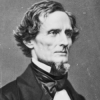Jefferson Davis

Jefferson Davis
Jefferson Finis Daviswas an American politician who was a U.S. Representative and Senator from Mississippi, the 23rd U.S. Secretary of War, and the President of the Confederate States of America during the American Civil War. He took personal charge of the Confederate war plans but was unable to find a strategy to defeat the more populous and industrialized Union. His diplomatic efforts failed to gain recognition from any foreign country, and at home, the collapsing Confederate economy forced his government...
ProfessionPolitician
Date of Birth3 June 1808
CityFairview, KY